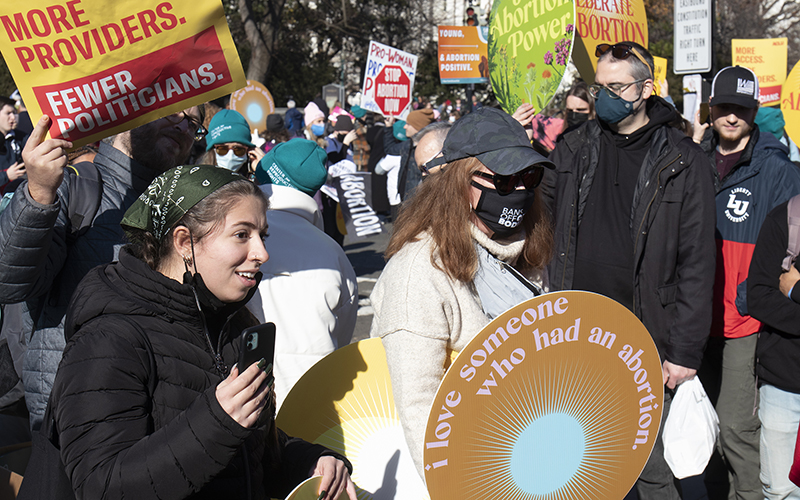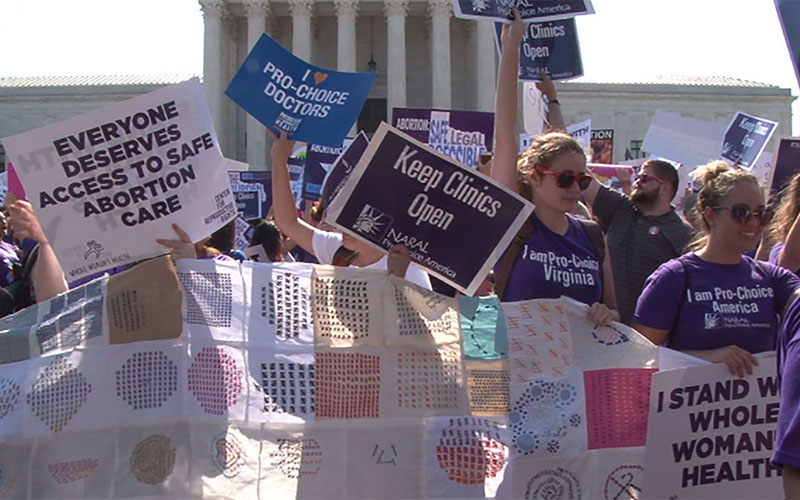
Hundreds of protesters rally outside the Supreme Court on Dec. 1, 2021, as justices hear arguments in a challenge to a strict Mississippi abortion law that many think could be the case that overturns the nearly 50-year-old Roe v. Wade decision that recognized a woman’s right to an abortion. (File photo by Ulysse Bex/Cronkite News)
PHOENIX – A bill banning abortions after 15 weeks gestation, except in cases of medical emergency, has passed the state Senate on a party-line vote and been sent to the House of Representatives.
Senate Bill 1164 – which is similar to a 2018 Mississippi abortion bill that’s now being considered by the Supreme Court – makes no exceptions for rape or incest.
During debate on the Senate floor on Feb. 15, several Democratic senators raised concerns about not protecting victims of rape or incest.
The bill’s sponsor, Sen. Nancy Barto, R-Phoenix, dismissed such concerns, calling the bill “the right thing to do” to protect women and the unborn.
“The baby inside of a woman is a separate life and needs to be protected. All life is sacred,” she said.
Democrats also warned that SB 1164 would heavily affect low-income and minority communities.
“Enacting this abortion ban would disproportionately affect folks on the lower end of the economic spectrum, communities of color, most of the people in our state who are on the edges and are the most vulnerable,” said Sen. Stephanie Stahl Hamilton, D-Tucson.
One Democrat called the measure illegal.
“The law as it stands right now is unconstitutional. This is a blatantly unconstitutional proposal that we are debating right now,” said Sen. Martin Quezada of Phoenix.
Doctors could be charged with a Class 6 felony and lose their medical licenses if they perform an abortion that does not meet the bill’s guidelines.
“If there is a violation of law,” Barto said, “it will be reported and there will be criminal investigations and follow-up and there will be arrests made. But it certainly won’t be bursting in on an abortion clinic.”
Republicans hold a 16-14 majority in the Arizona Senate, which approved SB 1164 on a 16-13-1 vote and sent it to the House, which also is narrowly controlled by Republicans.
If the high court upholds the Mississippi law, advocates for women’s rights fear it will dismantle the landmark 1973 decision Roe v. Wade, leaving abortion rights for the states to decide. Under Roe, states can’t ban abortion procedures before fetal viability, which is believed to occur by 24 weeks gestation.
“Right now, the only reason abortions are accessible in the state of Arizona is because of Roe v. Wade. … If it is overturned or it (the question of abortion) is sent back to the state of Arizona, then essentially it will become illegal again,” said Murphy Bannerman, Planned Parenthood Arizona’s communications manager.
She also said tighter abortion restrictions do not deter women from seeking abortions.
“They will go to unsafe practitioners and will try to self-manage their own abortion, which can lead to multiple complications,” Bannerman said.
“We are preparing as Planned Parenthood Arizona for how we can assist patients in the coming months and going into the summer where abortion may be illegal in the state of Arizona depending on the Supreme Court’s decision.”
The Supreme Court, which has a 6-3 conservative majority, is expected to rule on the Mississippi law by this summer.


